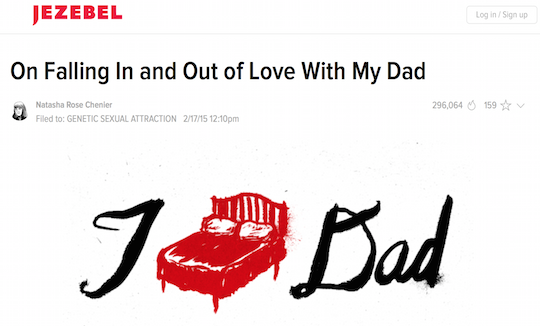Laura Bennett has written an interesting piece on the microgenre of harrowing first-person essays, which has become a distinctive and popular type of internet writing over the last few years. Bennett knows of what she speaks: as a senior editor at Slate, she reads and often helps produce such work. But she also worries that the confessional essay appeals to inexperienced or emerging writers who maybe don’t appreciate the ramifications of publishing a clickbait essay about, for example, fucking their dads.
That’s an amazing essay. It also has something of the Penthouse Letter to it—not in that it’s prurient, but in that it encourages us to imagine the author is a character in a crazy story. Of course, Natasha Rose Chenier is a real person you can Google after she comes in for a job interview. The way she might feel after publishing this amazing essay is how one of those first-person Penthouse Letter characters might feel if she became a real person who had to sign her name: ambivalent.
I mention this because I was mildly internet famous last weekend, and some people wrote some really mean things about me. I’m not linking to the example I have in mind, for several reasons. One is that this mean thing written about me is not actually about me; it’s about my name as read in a byline. Let us remember, as we savage the stupid assholes who dare to express ideas on the internet, that those names correspond to actual people, many of whom experience interiority. Chenier is not just a woman who fucked her dad, but also a person who is trying to do right and find satisfying meaning and write some interesting essays.
Perhaps the most pernicious feature of the internet is that it allows us to vituperate people we have never met—people who are only ciphers to us and therefore do not trigger our empathy. They’re real, though.1 And even if they weren’t, we should maybe not use history’s most advanced medium to practice condemning people. Worldwide communication might offer something more than an opportunity to shame others and draw attention to ourselves.
But the internet is what, 20 years old at this point? In the first few decades of the printing press, what little paper was not used for Bibles went almost entirely to slander. We’ve got time to figure this thing out. But I wish the message “be decent to each other” would go viral. I guess it did the first time, given our printing press example, but even then it was widely misconstrued.




